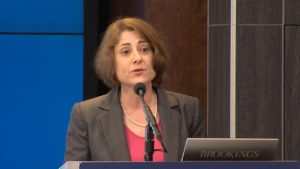Vidya Sethuraman
India Post News Service
As we begin the year 2023, inflation is down, but that is the end of the good economic news. The threat of a recession still looms which could result in job losses and budget cutbacks that will bring pain to many Americans. How long would this recession last? What populations will suffer the most? What areas of the economy will be most affected and which ones will be resilient? And how will new political realities affect policy and legislation both at the federal and state levels? These points were discussed with an expert panel in a Q&A session on Jan 20.

The inflation report for December showed that while inflation came in at 6.5% over the course of last year, it continued to decline in the second half—and even closed out 2022 with a 0.1% decrease in overall prices compared to November’s data. After a massive hiring spree in the first two years of the pandemic, industry giants like Amazon, Google and Meta are in the layoff spree.
Mark Zandi at Moody’s Analytics currently has it at 50–50 odds that the U.S. economy will slip into recession and a recent Bloomberg survey of 40 economists set higher odds of 70-30.
Dr. Wendy Edelberg, Director of The Hamilton Project and a senior fellow in Economic Studies at the Brookings Institution said I think the next year is going to be incredibly challenging. Stocks tumbled last week, and the DOW was down 275 points, giving up its gain for the year.
Dr. George Fenton, Senior Policy Analyst at the Center for Budget and Policy Priorities (CBPP) said we really do not know whether there will be a recession in 2023 or not. Economists can’t read the pattern clearly because job growth is expected to slow by the fourth quarter as is the Gross Domestic Product (GDP). But neither of those is actually declining now. We’re really not sure what’s going to happen.

Dr. Rakeen Mabud, Groundwork Collaborative Chief Economist and Managing Director of Policy and Research said I unfortunately have a similarly depressing assessment. The Fed has increased interest rates seven times over the last year and will likely do it again at the end of January. But she said higher prices and rising unemployment are not the best strategy to curb inflation because it will throw millions of people out of work, slow down wage growth, and cause immense financial and economic pain. Mabud urged that Congress should pass a federal price gouging law and the Federal Trade Commission and Department of Justice should go after the profiteers.







